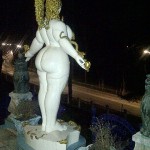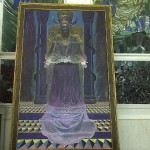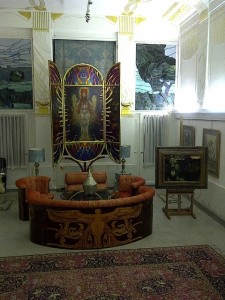= Wer seinen Sommer so erlebt, daß er ihm noch den Winter wärmt.
(He who experiences the summer in such a way that it still warms him through the winter)
– Definition of Lebenskünstler from Alfred Polgar (1873 – 1955), Austrian writer and critic

Esther statue adorning front porch of Ernst Fuchs’ Museum / Otto Wagner Villa in Vienna
Last week a group of friends and I were given a private tour of the Vienna villa / museum of Austrian artist of fantastic realism, Ernst Fuchs. As the tour guide enlightened us on the WWII atrocities that inspired Ernst Fuchs’ earliest horrific works, the feminine endowments that gave rise to his later sensual pieces distracted our attention. “Definitely a butt man.” Someone felt compelled to utter the obvious. And somewhere along the way, between the Jesus self-portraits and the Esther statue that towered from the front porch like the flying lady on a hood of a Rolls Royce (without the wings, standing tall with a big bosom and even bigger buttocks), the tour guide mentioned Ernst Fuchs’ wives and lovers and other lady friends.

Ernst Fuchs Room in Villa with Paintings and Designs
Three wives? Or four? And sixteen children with seven women? Or is it seventeen? If you include the one he adopted from yet another woman. And grandchildren? Well in his mid-eighties, how many is that per decade? We were all doing the math in our heads. I could see it on my friends’ faces. I could also see when they reached the result.
But the prim and proper tour guide was definitely smitten and a Ernst Fuchs connoisseur. Enamored or simply in awe? That too was discussed at length afterwards but we couldn’t agree. Afterall, who can know what lies in the depths of a woman’s heart. Perhaps not even she will admit the obvious.
In any case, either while expounding on yet another posterior perspective or answering yet another question about private pursuits (When was the first child born? How many by the same woman? How many when he left to live as a monk in Israel?), the loyal guide inevitably just shook her head and smiled, “He’s simply a Lebenskünstler.”
A Lebenskünstler. Of course. Her description was predictable. In fact I had used the exact same word on our way to the villa. A German woman had commented, “But I always thought the Austrians were so conservative” and I had piped in, “Have you seen Klimt, Schiele, Kokoschka, Hundertwasser? Austrians make quite an exception for their Lebenskünstler – the exotic animals in the zoo of society.”

Ernst Fuchs Photo
Oh those adorable untamable Lebenskünstler. Sixteen children but who’s counting (except those of us in the tour group). As long as they’re also producing art and having fun.
Lebenskünstler. What a word. With no proper English translation. Just the kind of word a secret word junkie like me can adore. Joining the ranks of Zeitgeist and Schadenfreude. Of course the concepts are universal but the English version of the word remains uninvented, as if refusal to give birth to its physical form could stymie its higher existence.
It is what it is.
One translator of Lebenskünstler recommended the French word bon vivant. I was hopeful until I translated it back into German again (a way to test if you have really nailed a translation). Unfortunately bon vivant is apparently a Lebemann which is more a playboy. And while a Lebenskünstler can indeed be a playboy (see Ernst Fuchs though I think he would deny being a playboy), that doesn’t quite fit.

Jesus Ernst Fuchs Painting
So we move to other possible translations. Here are some: hedonist (someone who sees the goal of life as being the pursuit of pleasure). This is close but still not quite right. Bohemian also doesn’t cut it. Neither does eccentric; enjoyer of the good life; master in the art of living; artist of life; pleasure-seeker – none of which are to be outdone by my personal favorite — connoisseur of the art of living.
Next time we attend a writing conference, promise me you’ll make them write, “KC Blau, Connoisseur of the Art of Living” on my name tag. You can be the master in the art of living.
God forbid we’d dare to write Lebenskünstlerin because there are no female Lebenskünstlers. In German the female version would be a Lebenskünstlerin and that just doesn’t seem to exist. Nope. It seems that Lebenskünstlerei is preserved for men alone.
So maybe one translation was closer than I originally thought. It described Lebenskünstler as – “special individuals.” Almost makes it sound like the Society of Lebenskünstler lobbied for politically correct treatment. Special individuals.

Ernst Fuchs Jesus Painting
So who are these “special individuals” exactly?
Perhaps a direct translation would shed some light on the matter. Lebenskünstler is a compound word of the word Leben (life) and Künstler (artist). Life artist. But that doesn’t really tell you what it is either.

Hauntingly accurate portrait by teenage Ernst Fuchs of himself as an old man
Remember the 2002 Leonardo Di Caprio film, Catch Me if You Can? It was based on the life of Frank William Abagnale, Jr.. That character is the perfect example of a Lebenskünstler. A Lebenskünstler is a man who treats life like a game with rules meant to be bent (or ignored or cheated) in order to successfully squeeze what he wants out of it. So while Lebenskünstler are usually artists who don’t follow the social norms but manage to get by and along with others just fine, nevertheless, they can also be others (like the Frank Abagnale guy). And a big part of what makes a Lebenskünstler a Lebenskünstler is the fact that the rest of society kind of just finds the behavior charming rather than condemnable.

Room in Ernst Fuchs’ Villa / Museum in Vienna, Austria (villa originally designed by Otto Wagner)
Silly you. Living under the bridge? Whiling away your days drawing in Parisian cafes? Fathered another child? Well you are a Lebenskünstler.
What about you? A Lebenskünstler? Or just a connoisseur of life?














